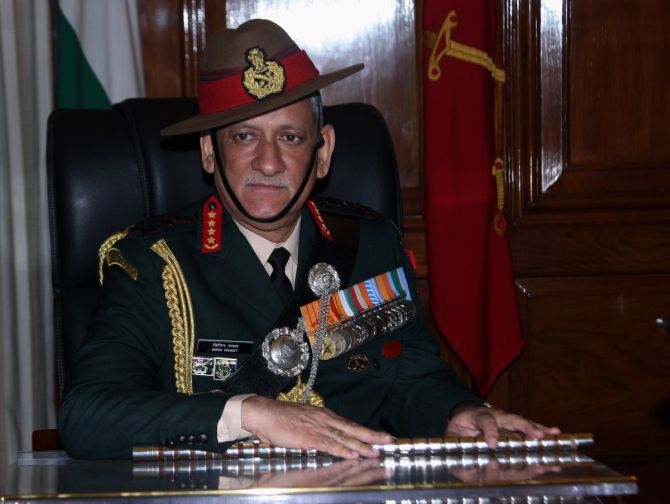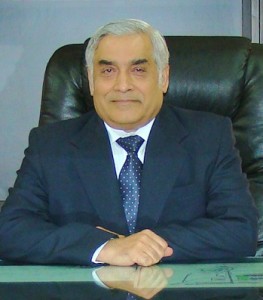सेना की युद्ध की तैय्यारी की कमी को तुरंत सुधारना अति आवश्यक है :An agenda for General Rawat
भारतीय राजनेता हमारी पानीपत की इतनी हारों के बाद और हज़ार वर्षों की गुलामी के बाद भी शांति के समय सेना को एक दम भूल जाते हैं और जब युद्ध की स्थिति आती है तो सेना तैयार नहीं होती . यही चीन के १९६२ के युद्ध मैं हुआ था . फिर जब बांग्लादेश ( पूर्वी पकिस्तान) पर आक्रमण करना था तो जनरल मानक शॉ ने तुरंत लड़ने से मना ही कर दिया था और छः महीने की तैय्यारी के बाद हमला किया . मुंबई व् संसद की हमलों के समय हमारी सेना युद्ध के लिए तैयार नहीं थी . यहाँ तक की एक समय था जब टैंक तो थे पर उनके गोले नहीं थे. फिर कुछ विदेशी तोपों के गोले सस्ते मैं रूस से खरीद लिए जो फुस्स निकले . जनरल वीके सिंह की चेत्वानियाँ सभी को याद हैं .रक्षा मंत्रालय मैं बाबू इतनी बुरी तरह हावी हैं की रक्षा मंत्रि फर्नांडिस को सब बाबुओं को सियाचिन जाने का आदेश देना पडा क्योंकि बर्फ पर चलने वाले स्कूटरों की खरीद मैं इतनी अडचनें डाली जा रही थीं की वह शर्मनाक थीं . जनरल वी के सिंह के समय की झूटी सैन्य क्रांति की खबर देश ने भुलाई नहीं है .वह स्थिति आज भी कुछ कम सही पर वैसी ही बनी हुयी है क्योंकि बाबु रक्षा मंत्रि से दिन मैं दो बार बात करता है जो सानिध्य सेनाध्य्क्षों को नहीं मिलता . वाजपेयी जी की प्रधान मंत्रि से सेनाध्यक्षों से अकेले मैं मिलने की परम्परा को पुनः शुरू करना भी आवश्यक है .
अब पकिस्तान समझ गया है की अब भारत बदल चुका है . वह सजिकल स्ट्राइक के बाद अचानक ही कुछ कर सकता है .
उधर चीन भी भारत के विएतनाम , मंगोलिया इत्यादि के सैन्य मदद , सीपीईसी का विरोध व् अमरीका व् जापान से दोस्ती से बौखलाया हुआ है .वह १९६२ की तरह भारत को नीचा दिखा सकता है.
इस लिए यह आवश्यक है की पुरानी गलतियों को दुबारा न दुहराया जाये . सेना के स्वाभिमान को कुछ वर्षों मैं बहुत धक्के लगे हैं . पहले एक रैंक एक पंशन के लिए रुला कर रख दिया . अब भी सेनाध्यक्ष के चयन मैं सेनिओरिटी को नहीं मान कर सेना के स्वाभिमान के लिए अच्छा नहीं हुआ . जनता को इसके कारणों का नहीं पता है परन्तु इसे इसे भविष्य मैं न ही दोहराया जाय तो अच्छा होगा . रक्षा सामग्री की खरीद मैं पुरानी कांग्रेस की जड़ता समाप्त हो गयी है . निर्णय क्षमता मैं बहुत सुधार हुआ है .परन्तु एक पूरी लड़ाई की तैय्यारी कुछ बड़े सौदों के करने से पूरी नहीं होती . लड़ाई मैं हर छोटी चोटी चीज़ भी ज़रूरी होती है . युद्ध तो समय पर कील न मिलने से भी हारा जा सकता है . इसके लिए सेना को सशक्त करना बहुत आवश्यक है .उसे बीस दिन की लड़ाई के लिए कोई भी कमी पूरी करने का पूर्ण अधिकार होना चाहिए . या तो बाबु युद्ध की सामग्री समय पर खरीदें या सेना को स्वयं खरीदने दें .
परन्तु अब नए सेनाध्यकशों पर पूर्ण विश्वास कर बीस दिन का युद्ध लड़ने के लिए तैय्यारियों मैं जो भी कमियाँ हैं उसे तुरंत दूर किया जाय . चीन के लिए माउंटेन ब्रिगेड की शीघ्र स्थापना व् सड़कों का बनाना बहुत आवश्यक है . आज हम हम तवांग पर बड़े व् लम्बे चीनी हमले को विफल नहीं कर पायेंगे.
सेना की मांगों पर बाबुओं का दखल कम होना बहुत आवश्यक है क्योंकि हमारे बाबु अपने अभिमान मैं लिप्त रहते हैं और उसके लिए सेना की नाक रगड़ते रहते हैं . .रक्षामंत्री को भी सोच समझ कर दखल देना चाहिए .सेना का राजनीती करण देश के हित मैं नहीं होगा . याद रहे एक बार एयरफोर्स के सोखों ने पंजाब के मुख्य मंत्रि से हस्तक्षेप करने को कहा था . रक्षा मंत्रि राजनितिक दखलंदाजी को रोक नहीं सकते हैं .सेनिओरिटी एक सेफ तरीका है . देश को DRDO के पिछले अध्यक्ष का अचानक हटाया जाना अच्छा नहीं लगा था .राजनितिक हस्तक्षेप जब भी होगा बुरा ही होगा . सेना की सेनिओरिटी को मानना व् उसे बीस दिन की लड़ाई के लिए सामग्री की पूर्ण खरीददारी की स्वतंत्रता देना ही वर्तमान परिस्थितियों मैं हितकारी होगा .इसमें सीएजी व् सीवीसी की भूमिका को भी बहुत सीमित करना होगा जैसे नेहरु जी ने एटॉमिक एनर्जी मैं किया था .
अमरीका , चीन व् पकिस्तान के मंतव्यों से दीखता है की अब युद्ध की संभावनाएं ज्यादा हैं और हमें उस के लिए तैयार रहना चाहिए .
इस बारे मैं रीडिफ़ का नीचे दिया लेख पढ़ें .
An agenda for General Rawat
The new army chief’s highest priority must be to address the critical hollowness in the Indian Army’s operational preparedness, says Brigadier Gurmeet Kanwal (retd).

As the head of perhaps the most potent instrument of the national will, a combat force that has held the nation together through many wars and insurgencies, General Bipin Rawat, the new army chief, has his work cut out.
There must be synergy between the new COAS and the government to successfully defeat Pakistan’s war against India through asymmetric means, manage periodic tensions on the Line of Actual Control with China and to continue to undertake effective counter-insurgency operations in Jammu and Kashmir and the North-Eastern states.
Surgical strikes across the Line of Control and counter-insurgency operations in J&K took centre stage during the year gone by and engaged the attention of the nation and the army’s top brass. However, it is operational preparedness and the improvement of the army’s combat effectiveness that should be the highest priorities for General Rawat.
Next in order of priority should be the modernisation of the force, the development of infrastructure, improvement in training standards and the resolution of organisational issues, including human resources management and the welfare of personnel.
In March 2012, General V K Singh, then the COAS, had written to the prime minister about ‘critical hollowness’ in the army’s operational preparedness.
He had pointed out large-scale deficiencies in weapons systems, ammunition and equipment in service in the army and the fact that many of the weapons and equipment were obsolete or bordering on obsolescence.
In particular, he had brought out that the artillery and air defence arms needed the infusion of modern guns, missiles and radars and the aviation corps required new helicopters to replace the ageing fleet.
The infantry was sorely in need of a replacement for the 7.62 mm basic rifle in use.
Two consecutive reports of the Comptroller and Auditor General of December 2011 and November 2012 brought out that the state of defence preparedness was a cause for serious concern.
The Standing Committee on Defence in Parliament has also noted these developments with concern several times.
In an unprecedented move, the Standing Committee on Defence insisted on meeting the three chiefs to take stock of operational preparedness. The Standing Committee on Defence has repeatedly urged the government to increase the defence budget to enable the armed forces to undertake meaningful modernisation.
Weapons, ammunition and equipment shortages have persisted for long and several chiefs before General V K Singh had written to the PM and the defence minister for help to make up the shortfall.
During the Kargil conflict in 1999, the nation had heard General V P Malik, the then COAS, make the chilling statement on national TV, ‘We will fight with what we have.’
Though the conflict was confined to Kargil district, 50,000 rounds of artillery ammunition had to be imported as an emergency measure because the stock holding was extremely low.
If it had become necessary to open another front, the shortage of artillery ammunition would have seriously hampered operational planning.
Military modernisation has two major facets: The replacement of obsolete and obsolescent weapons and equipment with modern ones, which results in increasing combat effectiveness; and, the qualitative upgradation of combat capabilities through the acquisition and induction of force multipliers.
General Rawat, like his predecessors, faces a major dilemma: How should a meagre budget be parcelled between improving operational preparedness while simultaneously making concerted efforts to modernise, especially the induction of force multipliers like state-of-the-art intelligence, surveillance and reconnaissance systems?
Logically, operational preparedness should take precedence over modernisation. The art of military leadership lies in finding an optimum balance so that all efforts that are made to enhance operational preparedness also contribute substantively to modernisation.
The new COAS will preside over the transformation of the army to a ‘network centric’ force capable of executing ‘effects-based operations’ over the full spectrum of conflict.
General Rawat must forge a light, lethal and wired army that can fight and win India’s wars on the battlefields of the 21st century — jointly with the navy and the air force.
The Transformation Study undertaken by army headquarters in 2009 will provide good pointers to the shortfalls in cutting edge operational requirements and the measures necessary to overcome these. For example, the army must improve its rapid reaction capability.
Ahead of his time as he was, General K Sundarji had nominated an infantry division as an air assault division during Exercise Brass Tacks IV in 1987. Thirty years later, the army still does not have an air assault division.
Now, of course, it needs at least two such divisions — both for conventional conflict and intervention operations.
The teeth-to-tail ratio needs substantial improvement. There is a requirement to reduce the costs incurred on manpower without cutting manpower itself; for example, by outsourcing routine maintenance assignments to trade.
The logistics chain must be streamlined to provide just-in-time logistics, rather than being dependent on numerous depots with huge inventories.
The troops engaged in providing perimeter security of army camps must be better trained to minimise casualties from terrorist attacks.
The battle drills of quick reaction teams must be snappier.
Training standards must keep pace with the induction of hi-tech weapons and equipment.
In the present era of strategic uncertainty, where some threats are predictable while many others are not, the policy should be to train for certainty and educate for uncertainty.
And, finally, General Rawat must pay attention to improving the welfare of the troops under his command, including improvement in combat gear, better rations and accommodation.
He must spend time resolving personnel issues, such as the grievances regarding pay and allowances, which have been sapping morale.
Civil-military relations have not been good in the recent past and the chief must work with civilian counterparts to improve relations by an order of magnitude.
No army in the world can be effective if it does not have the unqualified support of the civilian leadership and the bureaucracy.
Brigadier Gurmeet Kanwal (retd) is Distinguished Fellow, Institute for Defence Studies and Analyses (IDSA), New Delhi.


One Response to “सेना की युद्ध की तैय्यारी कमी को तुरंत सुधारना अति करना आवश्यक है : An agenda for General Rawat”